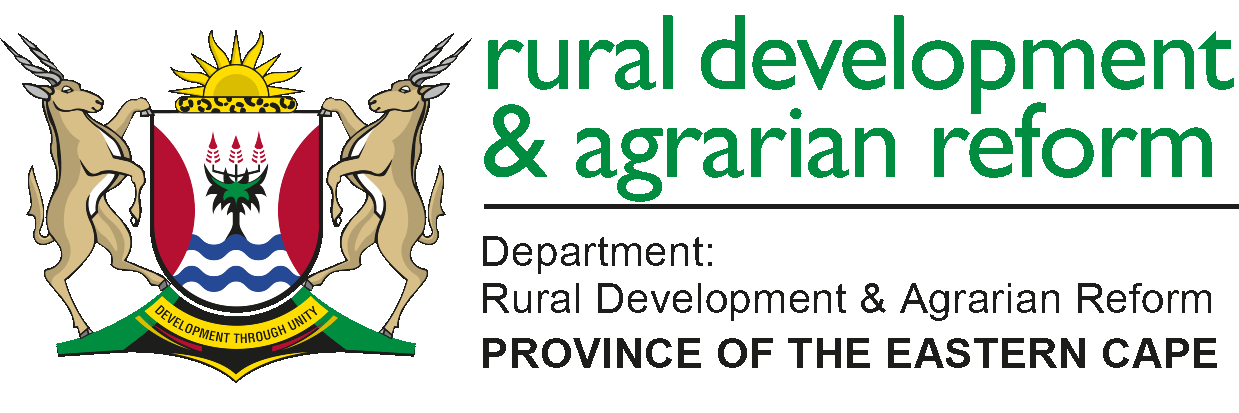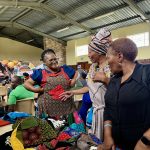Seamstresses ready to expand businesses with new industrial sewing machines
A group of Sarah Bartman Seamstress who got brand new industrial sewing machines and overlockers from the Eastern Cape Department of Rural Development and Agrarian Reform MEC Nonkqubela Pieters on Monday, 4 March, said they are ready to expand their textile production businesses.
With each of the 16 businesses in the Sarah Baartman District receiving an industrial size sewing machine with an overlocker machine, some of the women who took ownership of their machines said they were over the moon with the injection from the provincial government.
Vuyiswa Nobebe, a Seamstress from Bathurst who started sewing clothes in her thirties, said the new machines will boost her business as she will now be able to increase the number of clothing items she produces for her clients.
“These new machines took my life out of the muddy waters that was my business with old machines. It is like I am being born again because I have been struggling for a long time, now this has changed my life. When I started, I used a hand operated singer machine, I did odd sewing jobs here and there, including learning more sewing skills and about managing a sewing business,” she said.
Nobebe said when she did not have an overlocker machine her clothing items fetched low prices from buyers because they had untidy hem but all this is thrown into the past as her new overlocker machine will produce clean, beautiful and tidy hems for the clothes she makes.
Nombebe said her business, Masincedane project produces diverse church uniforms, trendy imibhaco and other women traditional clothing popular for imigidi, imitshato (wedding ceremonies) and other traditional ceremonies. She said with these new machines she will make more money as she plans to sell more clothing, including school uniforms and invest some of the revenue into her business.
Her colleague, Buysiwa Voyiza, a Grahams Town based Seamstress and owner of Noziqhamo cooperative said she was very excited when she got the new machines because now, she will be able to produce her client’s clothing on time because the machines are faster than her old machine.
“I am very excited. I will now be able to complete my client’s clothing on time. My busiest time is ahead of the Easter weekend as scores of church members order new uniforms, other buyers place order for traditional ceremonies,” said Voyiza, adding that the busiest time for her business was June and December as clients are gearing up for Imigidi.
Voyiza said she struggled for 20 years using low capacity and common machines she bought from retail stores that broke easily. She said with the new machines she will be able to produce any clothing and textile item, especially curtains for her clients.
Speaking during the handover in Bathurst, Pieters said government was hoping that the machines handed over to the small business owners will change their lives to be better.
“We want you to use these machines to make income for yourselves so that you eradicate poverty in your families. Don’t use these machines as surety to loan sharks. Don’t make clothes for clients who don’t pay deposit upfront. They must pay 50% deposit upfront and other 50% on delivery because if you don’t, you will not make money because some people ask you to make clothes for them but they don’t fetch their clothes and don’t pay you your money while you have spent your own money buying material and time producing these clothes,” said Pieters.
She said when people pay 50% deposit for their clothes, they commit to complete payment but if they don’t pay deposit, they don’t care whether they fetch it or not. Pieters urged the small enterprises to be tough business people for them to make money from their businesses because they are running businesses.
“Don’t be compassionate with your business. You don’t get your sewing material free of charge. You pay for it. So, your clients must pay 50% before you stock material for their clothing. Farmers don’t sell their produce the way you do. You pay for livestock when you collet or before collection. Stop being mother Christmas,” said Pieters.
Pieters said there are many development programmes being rolled out by the department throughout the Eastern Cape province and encouraged everyone interested to submit applications for support.
She said the Department has purchased 206 industrial sewing machines and overlockers for 103 cooperatives in the province benefiting 89 youth, 30 people living with disabilities, 283 adult females. From this list, 13 cooperatives are in the Alfred Nzo, 27 in Amathole, 13 in Chris Hani, 15 in Joe Gqabi, 19 in the OR Tambo, 16 in Sarah Baartman district.


